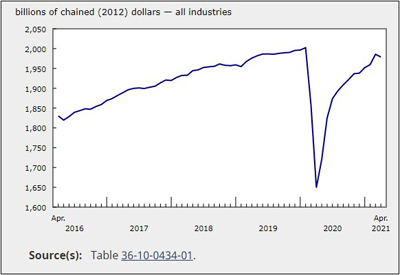GDP Contracts in April After 11 Months of Increases

July 8, 2021
Real gross domestic product (GDP) contracted 0.3% in April after 11 consecutive monthly increases. With the first decline in 12 months, total economic activity remained at about 1% below its level before the COVID-19 pandemic in February 2020.
Overall, 12 of 20 industrial sectors were down as gains in goods-producing industries (+0.5%) were more than offset by contractions in services-producing industries (-0.6%).
Preliminary information indicates a decrease in real GDP of approximately 0.3% in May. The retail trade, construction and real estate rental and leasing sectors contributed the most to the declines, while the finance and insurance, and wholesale trade sectors posted gains. Because of its preliminary nature, this estimate will be revised on July 30 with the release of official GDP data for May.
Retail trade sector down following record March
Retail trade retreated 5.5% in April, dampening the previous two monthly expansions, as 10 of 12 subsectors were down.
Many provinces and territories reinstated tighter public health measures in April aimed at slowing down the third wave of COVID-19. These measures largely curtailed the strong “non-essential” shopping seen in March.
Clothing and clothing accessories (-21.0%), building material and garden equipment and supplies (-7.9%), sporting goods, hobby, book and music (-18.2%) stores and other traditional brick-and-mortar stores that rely more on in-store traffic recorded the largest declines.
Food and beverage stores (+0.5%) and miscellaneous store retailers (+0.5) were up, offsetting some of the declines.
Strength in construction sector continues
The construction sector rose 2.4% in April, up for a fifth consecutive month, as all components increased.
Residential building construction (+4.1%) led the expansion, with a fifth consecutive monthly increase. Continued growth in single-family homes and multi-unit dwellings construction more than offset lower activity in home improvements and renovations.
Repair construction increased 0.6%, while engineering and other construction activities grew 1.6%. Non-residential building construction rose 1.1%.
Real estate down as home resale activity slows
Real estate, rental and leasing contracted 0.7% in April, down for the first time since October 2020.
The output of offices of real estate agents and brokers dropped 10.6%, as home resale activity in the majority of Canadian urban centres, mainly in Ontario and British Columbia, slowed in April.
Legal services, which derive much of their activity from real estate transactions, declined 0.6% in April. Other professional, scientific and technical services, including scientific research and development, were down 0.3%, while computer systems design and related services (+0.7%) and architectural, engineering and related services (+0.5%) led growth in the broader professional, scientific and technical services sector.
Manufacturing sector retreats
The manufacturing sector contracted 1.0% in April, following 1.5% growth in March, as both durable and non-durable manufacturing declined in April.
Durable manufacturing decreased 1.8% in April, following a 2.1% increase in March, on declines largely concentrated in transportation equipment. The subsector was down 8.6% as the global semiconductor chip shortage contributed to production disruptions in motor vehicle (-20.9%) and motor vehicle parts (-13.4%) manufacturing industries.
Non-durable manufacturing edged down 0.2% in April, as five of the nine subsectors were down. Contributing the most to the decline was plastics and rubber products manufacturing (-6.4%). Lower demand from motor vehicle and motor vehicle parts manufacturers partially contributed to this decrease. Petroleum and coal product manufacturing contracted 3.3%, as some refining facilities suspended activities for maintenance in April. Offsetting some of the decrease were gains in chemical manufacturing (+3.4%) and food manufacturing (+1.5%), which recorded a notable increase in seafood product preparation associated with an early start to snow crab fishing in April.
Mining, quarrying and oil and gas extraction up
Mining, quarrying, and oil and gas extraction grew 1.4% in April, as all three subsectors were up. The gain in April came on the heels of a 1.7% increase in March
Mining and quarrying (except oil and gas) rose 1.5% in April, following a 2.4% gain in March. Metal ore mining (+3.0%) led the growth, as iron ore (+5.9%) and copper, nickel, lead and zinc mining (+4.8%) made the largest contribution to the growth. Coal mining increased 1.8% in April, while non-metallic mineral mining declined 2.4%, mainly as a result of lower potash and diamond mining.
Support activities for mining, and oil and gas extraction grew 7.9% in April, as all types of services were up.
Oil and gas extraction edged up 0.2% in April. A 1.9% decline in oil sands extraction, resulting from lower synthetic oil production in Alberta, was more than offset by a 2.7% increase in oil and gas extraction (except oil sands), as both crude petroleum extraction and natural gas extraction were up.
The public sector continues to grow
The public sector (educational services, health care and social assistance, and public administration) grew 0.3% in April, as most components were up.
The health care and social assistance sector rose 1.3% in April, up for the 12th month in a row, with ambulatory health care services (+2.4%) leading the growth.
The public administration sector grew 0.4% in April, led by federal government public administration (excluding defence) (+1.0%), in part as a result of a ramping up of preparation activities prior to the 2021 Census of Population and 2021 Census of Agriculture.
The educational services sector declined 1.3% in April, driven by a 3.0% decrease in elementary and secondary schools. In 2021, the Government of Ontario moved the annual spring break from mid-March to mid-April to limit the spread of COVID-19. This decision led to an atypical decline in output, resulting from the one week less of class in April.
The accommodation and food services sector decline
Accommodation and food services declined 4.6% in April, following the reintroduction of lockdown measures across many parts of the country to combat the third wave of COVID-19.
Food services and drinking places contracted 6.5%, as activity across all forms of establishments decreased in April.
Despite continued domestic and international travel restrictions, accommodation services rose 0.5% in April. A decline in traveller accommodation was more than offset by an increase in activity at recreation vehicle parks and recreational camps and rooming and boarding houses, with camping continuing to be an alternative to international travel for Canadians during the COVID-19 pandemic.
Other sectors
The finance and insurance sector declined 0.6%, as credit intermediation and monetary authorities (-0.5%), financial investment services, funds and other financial vehicles (-1.5%), and insurance carriers and related activities (-0.4%) were down.
The transportation and warehousing sector decreased 0.8% in April. Rail transportation (-2.9%), pipeline transportation (-2.4%) and support activities for transportation (-1.1%) were major contributors to the decline.
The utilities sector was down 1.2%. Warm weather coupled with reduced industrial and commercial output contributed to declines in electric power generation, transmission and distribution (-1.3%) and natural gas distribution (-2.4%).
The wholesale sector edged down 0.2% in April as a 7.0% jump in building material and supplies wholesaling and a 0.9% increase in personal and household goods wholesaling were more than offset by declines in the remaining seven subsectors.
Source: Statistics Canada, www150.statcan.gc.ca/n1/daily-quotidien/210630/dq210630a-eng.htm?CMP=mstatcan











